The Equality Act 2010 explained
Many Deaf and hard of hearing people suffer from discrimination in their lives, especially at work. However, it is illegal to discriminate against anyone with a disability, for whatever reason.
This law was laid out in the Equality Act of 2010, and in this short post, we will explain the act and how it affects both you and your employer.
What is the Equality Act of 2010?
The Equality Act 2010 replaced the old Disability Discrimination Act 1995 and legally protects people from discrimination in the workplace and in wider society.
It was created to make the law easier to understand and strengthen the protection of people in certain situations.
The Equality Act sets out the different ways in which it’s unlawful to treat someone based on their disability, age, gender, sexuality or race.
What the Equality Act says about disability discrimination
The law is very clear: people must not be discriminated against because of their disability. This also includes if someone even thinks you have a disability, known as discrimination by perception, or if you are connected to someone with a disability, known as discrimination by association.
How it affects Deaf and hard of hearing people
Employers have a legal duty to provide reasonable adjustments under the Equality Act 2010 and if they fail to provide these, it is unlawful disability discrimination, and you can take legal action against them.
Disabled people may suffer from direct discrimination in the form of being treated less favourably than others or being turned down for promotion. There is also indirect discrimination. This can include things like harassment or being treated in a way that makes you feel humiliated, offended or degraded.
Access to Work
Under the Equality Act 2010, you have the right to ‘Access to Work’, a government funded grant that can assist your employer with the costs of providing practical support in the workplace such as equipment or support workers.
After you apply for Access to Work, an Access to Work adviser will contact you to find out what help you could get. They will also want to know what your employer has done to support you i.e. this could be changing the layout of your office or seating of your team meetings to enable you to lipread, or providing communication support for a training day.
How it affects employers
The Equality Act requires employers to make ‘reasonable adjustments’ for deaf and hard of hearing people so that they are not put at a disadvantage with non-disabled people. This includes making sure that disabled people can access jobs, education and services as easily as non-disabled people.
What is considered reasonable depends on a number of factors, including the resources available to the organisation making the adjustment. Discrimination arising from disability is unlawful unless the organisation or employer is able to show that there is a good reason for the treatment and it is proportionate.
Employers cannot ask job applicants about their health or disability until they have been offered a job, except in specific circumstances where the information is necessary for the application process or a requirement of the job.
If you feel you’ve been discriminated against in work, take a look at the Government’s official website on how to make a claim to an employment tribunal.




Leave a Reply
Want to join the discussion?Feel free to contribute!